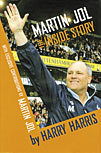 The Inside Story
The Inside Story
by Harry Harris with Martin Jol
Know the Score, £19.99
Reviewed by Luke Chapman
From WSC 253 March 2008
This is one of Harry Harris’s better books. Faint praise in view of the standard of some of his previous efforts, but, in picking over the bones of the Martin Jol era at Tottenham, Harris’s gossipy style is well suited to an omnibus edition of the long-running Spurs soap opera, in which catty politics and melodramatic intrigue are features of the script. Steering a steady course through events, Harris is neither feverishly pro-Jol nor anti-ENIC. Instead, he provides a tour through recent Tottenham history, charting the rumours and machinations, the brief highs and customary setbacks, while offering his “inside view” gleaned from “high level sources”. In fact there’s little that is particularly revelatory to anyone who has followed the story, and much of the sloppily edited material has the unmistakeable mark of filler.
The main problem, however, is that this is supposed to be a book about Martin Jol. After a promising introduction from the genial Dutchman in which he resolutely defends his record, Jol’s fortunes are inexorably tied up with those of Tottenham’s in a pedestrian trawl through the past three seasons.
Harris’ résumé of Jol’s early years and playing career in Holland, Germany and England is too brief; similarly with the sparse consideration of his spell as a coach back in the Netherlands, in which former associates are happy to heap praise on Jol as a man-manager and tactician. At Spurs, Jol at times almost appears to be a bystander to events to which he was supposed to be central, marginalised by other figures focused on the bottom line. Which may be an unwitting insight into why Jol got the sack in the first place: the story of modern Tottenham is a tale of money and football business as much as it is about football, and the doubts over whether Jol could deliver a lucrative Champions League place are ultimately what did for him.
It’s a pity for Jol and for this book. Jol may well be “the most popular manager in Britain” as Harris claims. As shown in these pages, he is an undeniably interesting character, who loves modern art, has read Kafka and Hemingway, wants to own a lighthouse and is apparently fond of Clacton-on-Sea. But there’s not enough of that idiosyncrasy here.
Will this be of any interest to those outside the Tottenham bubble? Fans of other clubs often cite bemusement at the attention given to a club that haven’t won the title for nearly 50 years, but the way the Spurs story unravels is perhaps a symbol of the desperation of former “big” clubs left behind by the Champions League closed shop. While Harris may not strike at the heart of corporate football and its workings, he does at least shed some light on the latest individual who has had to shoulder responsibility for Tottenham’s continuing also-ran status. But, like the club, this is a book that, when read between the lines, is too much about off-the-field shenanigans.